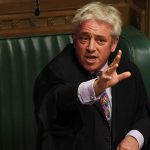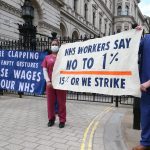The rise in the national living wage – announced by the Treasury a full 48 hours before the chancellor gets to his feet in the Commons – is one of the budget’s worst-kept secrets.
An early Christmas present for millions of low-paid workers? Well, no, actually. The pay rise does not come into effect until next April, after a chilly winter of soaring energy bills and other rising household costs.
It was widely predicted after it was signalled by Boris Johnson in his Tory conference speech, when he promised a “high wage, high skill, high productivity” economy.
Please use Chrome browser for a more accessible video player
“We’re not going back to a same old broken model with low wages, low growth, low skills and low productivity,” the prime minister told his adoring party faithful.
The rise from £8.91 to £9.50 an hour for up to 2.5 million workers is an inflation-busting 6.6% and the government claims it is worth £1,000 for a full-time worker.
Except that it is not, according to Labour’s shadow chief secretary Bridget Phillipson, who says it is “underwhelming” and falls short of her party’s £10-per-hour pledge.
“Much of it will be swallowed up by the government’s tax rises, Universal Credit cuts and failure to get a grip on energy bills,” she claims.
Budget 2021: Living wage and minimum wage increases to be announced in Wednesday’s budget
Budget 2021: Rishi Sunak ‘fighting in the fog’ as he sets the tenor of his chancellorship
Budget 2021: Rishi Sunak announces £6bn investment to tackle NHS waiting lists and improve digital tech in hospitals
That claim is backed by those clever pointy-heads at the Institute of Fiscal Studies think tank, who estimate that those on Universal Credit will see their disposable income go up by just £250, not £1,000, because their taxes will rise and they will lose benefit.
There is better news on the way for public sector workers, however.
Please use Chrome browser for a more accessible video player
In Sunday morning TV interviews, Rishi Sunak signalled that an end to the public sector pay freeze is on the way in his budget on Wednesday for 2.6 million teachers, police and civil servants.
The reason for the chancellor’s sudden generosity is obvious: the potentially crippling labour shortages that have left supermarket shelves empty and threaten a miserable Christmas without turkeys and all the traditional trimmings.
Shops and haulage firms have already been forced to raise wages in a bid to tackle the shortages. Supermarkets Sainsbury’s and Morrisons are offering above living wage wages for temporary workers at Christmas.
Lorry drivers are being offered £1,000 joining bonuses and higher wages and it is reported that bins could go un-emptied at Christmas as bin lorry drivers are lured way by higher wages offered by supermarket chains.
Other key tax moves in the budget which could ease the growing cost of living crisis facing millions of families are fuel duty and VAT on household energy bills.
On fuel duty, will the chancellor end the freeze? Will he preserve it to keep white van man happy? Or with COP26 just days away will he please the green lobby by raising fuel duty?
And on energy bills, the prime minister promised during the Brexit referendum five years ago that once the UK left the European Union it would be free to set its own rates of VAT.
Ending the freeze on fuel duty would be a crippling blow for many drivers when prices at the pumps are at a record high.
And might the time be right to cut VAT on household energy bills? Plenty of MPs will claim there has never been a better time.
These are two key budget decisions that have not been announced yet. In a rant aimed at the Treasury, the Speaker was incandescent over all the pre-budget announcements.
As for the rise in the national living wage, it may not be an early Christmas present, but it would be churlish to suggest it is not welcome news for many low-paid workers.
The chancellor says it “keeps us on track to meet our target and end low pay by the end of this parliament”.
That is a bold and ambitious goal. But the budget increase is at least a start.
Follow budget coverage live on Sky News on Wednesday with the chancellor’s announcement from 12.30pm






















